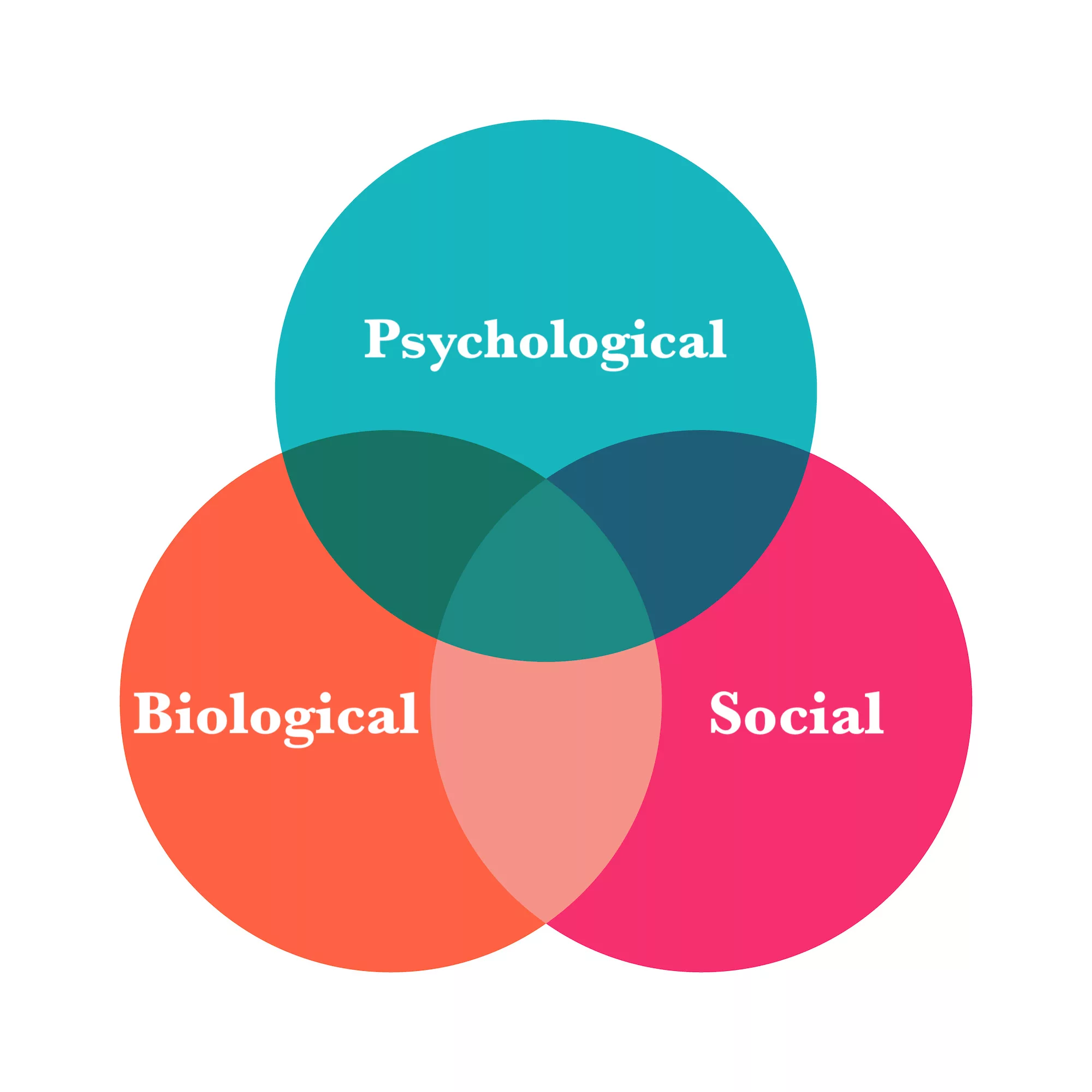2024 Guide on the BPS Model & Assessment in Mental Health and Social Work
Unveiling the Transformative BPS Model of Health. Everything You Need to Know
What exactly is the biopsychosocial model (BPS model), that promises to revolutionize our understanding of well-being? You’re about to find out! In a world where mental health has taken center stage, the pursuit of a holistic and balanced lifestyle has become an indispensable goal for many.
In this Social Work Portal article, we will give you a concise overview of the biopsychosocial model (BPS model), a holistic approach that integrates the physical, psychological, and social aspects of well-being.
 Overview of the BPS Model of Health
Overview of the BPS Model of Health
Buckle up, as we explore the interconnections between the body, mind, and social environment.

See Also: Best Macro Level Social Work – Guide for Macro Social Workers
Would you like to share feedback on this BPS model of health guide? If so, contact the Social Work Portal Team.
Table of Contents: BPS and BPSS Model Social Work & Mental Health
Keep on scrolling down this page to read each section or click any link below to go directly to that section.
- What is BPS Model in Social Work and Mental Health?
- Key Components of BPSS and BPS Model
- What is BPSS Assessment? | Overview
- Purpose of BPSS Assessment
- Conclusion | BPS Model of Health
- FAQ | BPS Model of Health Summary
Don’t Miss: Biopsychosocial Assessments, Intakes and Templates | Job Aid
What is the BPS Model of Health in Social Work and Mental Health?
The BPS model of health in social work and mental health refers to the biopsychosocial model of health, which is a holistic approach to understanding health and well-being.
The BPS model recognizes that health is influenced by multiple factors, including biological, psychological, and social factors.
BPSS model social work and mental health adds the spiritual factor to the approach.
If you’re looking for software that helps you manage all your clients and cases, sign up for the All-in-One Case Management Software today & experience the revolution in the way you run your social work or mental health practice.
Next, we’ll go over key components of the BPSS social work and mental health model.

Do you have any questions about BPSS model social work and mental health approach? If so, contact the Social Work Portal Team.
Key Components of BPSS and BPS Model | BPSS Social Work and Mental Health Approach
The key components of the BPS model in social work and mental health involve the interplay between biological, psychological, and social factors while BPSS adds a spiritual factor to the approach.
Here’s a breakdown of each of the components of the BPSS and BPS model:
Biological Factors – BPS Social Work & Mental Health
Biological factors are vital in the BPSS model social work and mental health.
Key biological factors considered in the BPS model of health include:
- genetics
- neurological processes
- hormonal imbalances
- chronic diseases, and
- age-related changes.
Considering these factors enables healthcare professionals to provide tailored and effective care based on individual needs.
Our cutting-edge client and case management platform empowers you to efficiently track, organize, and collaborate on client cases, ensuring seamless coordination and improved outcomes.
Startup today and experience the full power of the All-in-One Client and Case Management Software.
Psychological Factors – BPSS Social Work & Mental Health
Psychological factors are key in the BPS model of health.
Examples of psychological factors in the BPSS model social work and mental health include:
- stress
- health beliefs
- mental health
- cognitive processes
- emotional well-being
- coping strategies, and
- personality.
 BPS Social Work & Mental Health Model
BPS Social Work & Mental Health Model
Social Factors – BPSS Social Work & Mental Health
These factors refer to an individual’s social environment, including their relationships, community, and cultural context. Here are some examples of social factors in the BPSS social work model that play a crucial role:
- social support
- socioeconomic status
- cultural beliefs and practices
- environmental factors
- access to healthcare and education
- employment and work-related stress
- social networks and social isolation
Spiritual Factors – BPSS Social Work & Mental Health
Here are some spiritual factors within the context of the BPSS model:
- beliefs and values
- meaning and purpose
- connection and community
- rituals and practices
The BPSS and BPS model recognizes that health is not solely determined by biological factors or the absence of disease, but rather by a complex interplay of biological, psychological, social, and spiritual factors.
Looking for client and case management software that comes with case note templates, intakes, letters, assessments (including BPSS assessment template), and so much more?
Try our Social Work Client and Case Management Hub today and get instant access to a seamless solution that optimizes your workflow, increases productivity, and delivers results.
In social work and mental health practice, the BPSS and BPS model is used to guide assessments, interventions, and treatment which is exactly what we’ll be looking at next.

Related: Guide on Screening Tools for Anxiety, Depression, OCD, PHQ, and GAD
What is Biopsychosocial Spiritual Assessment? | BPSS Assessment
A biopsychosocial spiritual assessment (BPSS assessment) is a comprehensive evaluation tool used in various fields, including healthcare, social work, and mental health.
The BPSS assessment process typically involves a combination of:
- interviews
- questionnaires
- observations, and
- medical or psychological tests.
A BPSS assessment template is a structured framework used to gather information about an individual’s biological, psychological, social, and spiritual factors in a systematic manner.
If you’re looking for a BPSS assessment template that you can send to your clients with just 1-click, subscribe to the Social Work Case Management Hub and change the way you work.
Furthermore, the BPSS assessment provides a comprehensive overview of their health and well-being. BPSS assessment template typically includes sections to document:
- personal information
- medical history
- mental health status
- social context
- spiritual context, and
- other relevant factors.
Read More: Best Guide to Soap Progress Notes
Purpose of BPSS Assessment in Mental Health and Social Work
The purpose of a BPSS assessment in mental health and social work is to obtain a comprehensive understanding of an individual’s mental health status, as well as the various factors that contribute to their well-being.
The BPSS assessment approach considers the biological, psychological, social, and spiritual factors that influence a person’s mental health, allowing practitioners to develop a holistic understanding of their needs and develop appropriate interventions.
The purpose of a BPSS assessment can be summarized as follows:
- Gathering Information
The BPSS assessment collects information about the individual’s biological factors, psychological factors, social, and spiritual factors into a BPSS assessment template.
- Identifying Strengths and Challenges
The BPSS assessment identifies the individual’s strengths, resources, and coping mechanisms, as well as the challenges they may be facing.
 Purpose of a BPSS Assessment in Mental Health and Social Work Practice
Purpose of a BPSS Assessment in Mental Health and Social Work Practice
- Developing Treatment Plans
The assessment findings inform the development of a tailored treatment plan. This may involve a combination of medical interventions, therapy, social support, and community resources.
- Monitoring Progress
The BPSS assessment provides a baseline against which progress can be measured. By periodically reassessing the biopsychosocial factors, practitioners can evaluate the effectiveness of interventions and make adjustments to the treatment plan as needed.
This is where SWP’s All-in-One Case Management Platform comes in to revolutionize the way you work. Subscribe now and take control of your case management process with Case Management Hub Software.
To conclude, the BPSS assessment plays a crucial role in understanding the complexities of an individual’s mental health and developing an inclusive and person-centered approach to their care.
Related: Biopsychosocial Assessments, Intakes, and Templates
Conclusion | BPS Social Work & Mental Health Model
The biopsychosocial BPSS and BPS model of health offers a holistic and comprehensive approach to understanding and addressing health and well-being.
By considering the interplay of biological, psychological, and social factors, the BPS model social work and mental health recognizes that an individual’s health is influenced by multiple dimensions.
The BPS model has led to a shift towards a more comprehensive and inclusive approach in healthcare, promoting better outcomes and improved overall well-being.
By embracing the BPS model, healthcare professionals can provide effective and holistic care that considers all aspects of an individual’s health.

Don’t Miss: Mental Health Assessment Guide with Examples
FAQ | BPS Model of Health Summary
What is the BPS model?
The BPS model of health in social work and mental health is a holistic approach to understanding an individual’s health and well-being.
What are the key components of BPS social work and mental health?
The key components of the BPS model in social work and mental health involve the interplay between biological, psychological, and social factors.
What is the BPSS assessment?
A biopsychosocial spiritual assessment (BPSS assessment) is a comprehensive evaluation tool used in various fields, including healthcare, social work, and mental health.
What does the BPSS assessment template typically include?
BPSS assessment template typically includes the following sections:
•personal information
•medical history
•mental health status
•social context,
•spiritual context, and
•other relevant factors.
Note: Content on this website (socialworkportal.com) is copyrighted and protected under applicable copyright laws. Unauthorized reproduction, distribution, or use of any content from the website, without explicit written permission, is strictly prohibited. Read: Terms of Use.
Social Work Portal Disclaimer: Social Work Portal is not a social work agency and we do not refer social workers. This web site is provided for educational and informational purposes only and does not constitute providing medical advice or professional social and healthcare services. The information provided should not be used for diagnosing or treating a health problem or disease, and those seeking personal medical advice should consult with ... Read our full disclaimer here: Social Work Portal Disclaimer.

Image sources: Stock.adobe.com


